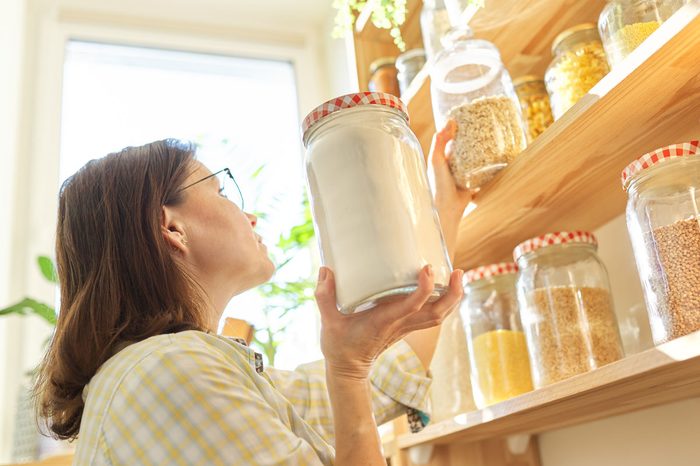
Pantry staples dietitians stock up on
When you’re at home pretty much 24/7 (hello, coronavirus quarantine), it helps to have versatile and nutritious pantry staples on hand so you can whip up quick, healthy meals in no time. As a registered dietitian, I’ve been utilizing my pantry a lot. One of my go-to pantry recipes? I love to make a quick lupini bean salad. While my recipe calls specifically for lupini beans and pistachios, you can really use whatever beans you have on hand—chickpeas or white beans would also work well.
Since I know you want more than one easy pantry meal idea, I compiled this list of staples from my dietitian colleagues—including easy recipes for cooking with these must-have items.
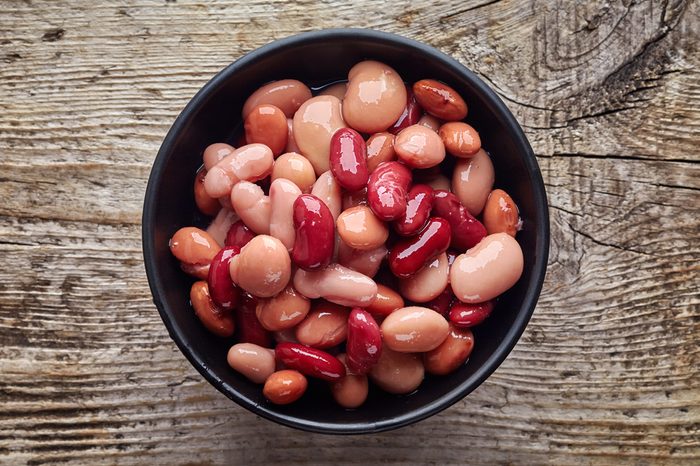
Canned beans
“These are a powerhouse of nutrition with plant protein and fibre,” says Vandana Sheth, RDN and author of My Indian Table. “They offer a variety of health benefits, including help with heart health, blood sugar management, and much more.” Sheth suggests tossing them into a chopped salad, smashing them and adding them to a sandwich, or roasting them into baked chickpeas. “For the creative cook, you can also make hummus from chickpeas,” adds Lisa Young, RDN and author of Finally Full, Finally Slim. Opt for no-salt-added canned beans when you can find them. And if you’re feeling really adventurous, save the liquid, aka aquafaba, to use in vegan desserts. (Plus, check out these nutritious canned bean recipes.)
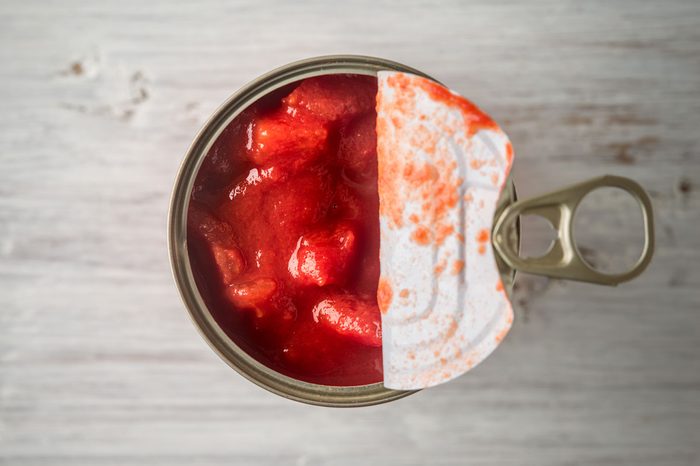
Canned diced tomatoes
Many dietitians are a fan of this canned good. “Diced tomatoes are versatile and inexpensive, and can be added to multiple dishes like soups or stews, and can be made into sauce,” says Lisa Andrews, RD, in Cincinnati. And tomatoes aren’t short on nutrients at all. “Tomatoes are rich in lycopene, an antioxidant for heart health,” says New Jersey-based dietitian Barbara Baron, RD. You can also make a shakshuka with a can of diced tomatoes.
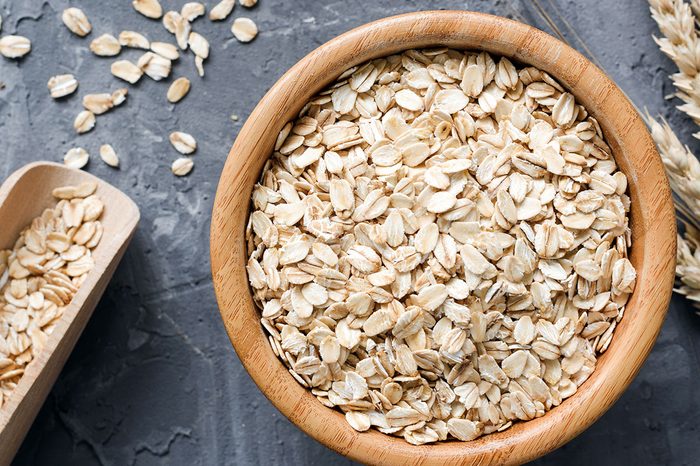
Rolled oats
Oats aren’t just for bowls of oatmeal. “Rolled oats are a long-lasting, nutritious, and versatile pantry staple that can be used in nearly every aspect imaginable,” says Erin Hendrickson, RDN, a food waste expert in Nashville. “They’re great for overnight oats, as a binding agent for plant-based burgers and in no-bake energy snacks, and can even be used to make a beverage. Hello, oat milk! Not to mention, they’re extremely affordable and a great way to stretch your food budget.”
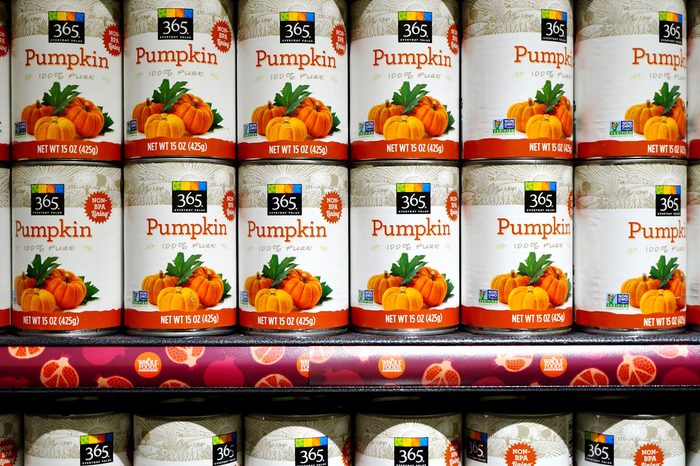
Canned pumpkin puree
This might seem like an odd staple to add to the list, but you can make so many delicious things with canned pumpkin. These include pumpkin pancakes, a pumpkin pie smoothie, and you can even add the winter squash to mac and cheese recipes for an extra serving of veggies. “This pantry item is loaded with vitamin A and beta carotene to help the immune system,” says Kate Ricciardi, RDN, a telehealth dietitian. Make sure you shop for 100 percent canned pumpkin; other varieties may have added sugar.
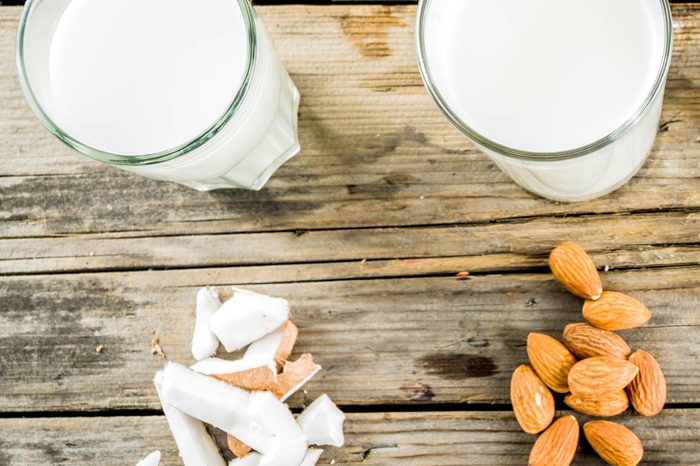
Plant-based milk
Why not add a few boxes of plant-based milk to your grocery order? “They’re shelf-stable until opened and have a longer shelf life than dairy milk,” says Joanna Foley, RD, in San Diego. Opt for unsweetened oat milk, almond milk, soy milk, and more. Plus, these milks may work really well for people with allergies. A 2020 study published in Nutrition Today found that soy allergies are less prevalent than we may have thought. In fact, the study found that allergies to soy are lower than allergies to the other top seven allergens (milk, eggs, fish, crustacean shellfish, tree nuts, peanuts, and wheat). You can use a plant-based milk as a substitute for dairy milk in almost any recipe. Try this simple chia pudding recipe.
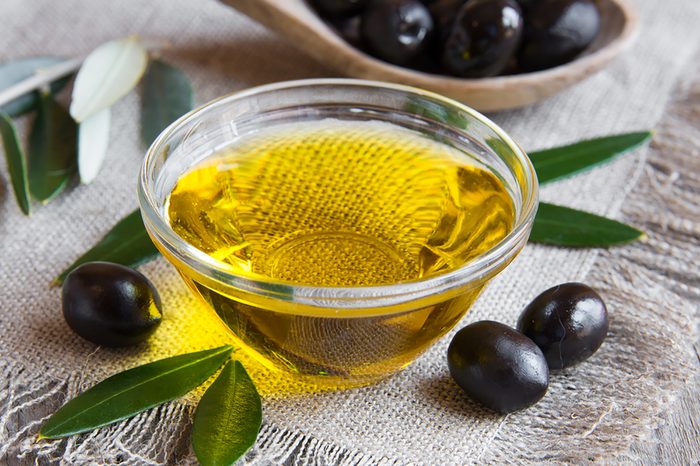
Extra-virgin olive oil
“This is my go-to cooking oil,” says Liz Weiss, RDN, host of the podcast Liz’s Healthy Table in Lexington, Massachusetts. “I even bake with it. EVOO contains good-for-you monounsaturated fats that research shows may play a role in reducing heart disease risk. As with any oil or fat, use it in moderation to keep calories in check.” She enjoys using olive oil in sautéed vegetables for soups, drizzled over cooked pasta for added flavour, and in muffins and quick breads. Extra-virgin olive oil also makes a mean salad dressing and tastes great in mac and cheese.
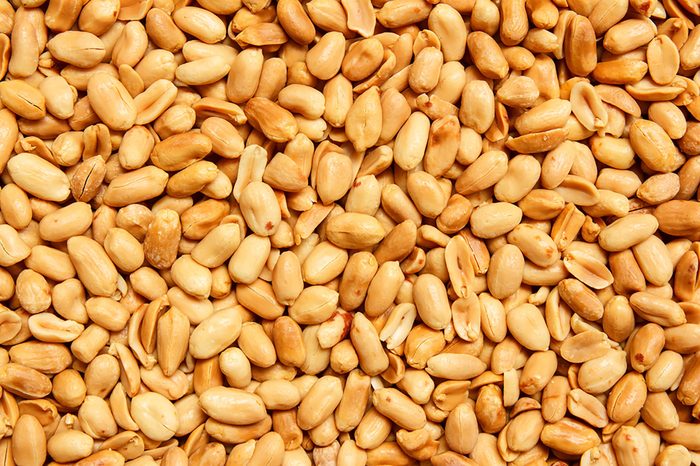
Peanuts
“This easy and shelf-stable protein provides needed nutrition in less volume, important in case of food shortages,” says Barbara E. Roberts, RDN, in Birmingham, Alabama. Don’t forget the nut butter version: “Peanut butter is a great food that helps you feel full because of its healthy fats and fibre,” says KeyVion Miller, RD, in Orlando. “It can be added to a bagel in the morning or melted into your oatmeal.” Whip up a batch of peanut butter granola bars, bread pudding, or a peanut butter smoothie.
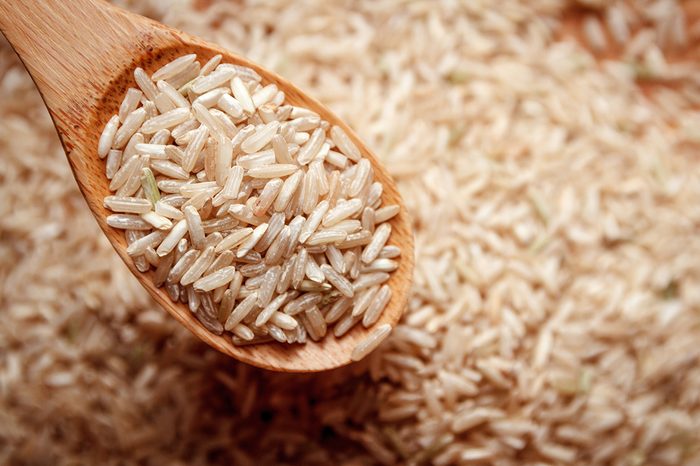
Brown rice
“One must-have in my pantry is Lundberg Family Farms Organic Short Grain Brown Rice,” says Toby Amidor, RD, a New York City area dietitian and a nutrition partner with Lundberg Family Farms. “Rice has over 15 vitamins and minerals, including B vitamins that help with metabolism, and iron and zinc to help keep our bodies healthy. It’s also affordable and has a long shelf life. I like to cook up a batch and store it in the refrigerator to incorporate into dishes throughout the week like soups, rice bowls, or as a rice side to chicken, fish, and beef dishes.”
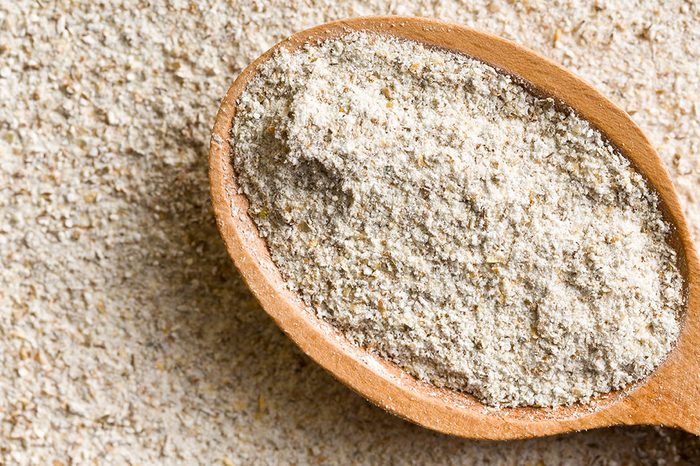
Whole-wheat flour
“This has been something hard to find, where I live in Connecticut,” says Bridget A. Sutherland, RD, in South Windsor, Connecticut. “You can make all sorts of items with it—bread, pancakes, muffins, tortillas, pitas, and naan. “I recommend whole-wheat flour, which is usually substituted one for one in most recipes. It adds fibre, vitamins, and minerals.” (Find out which supermarket foods legitimately last for years.)
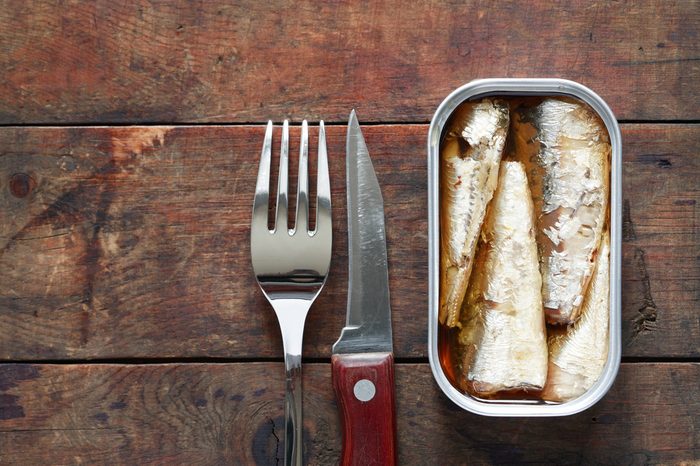
Canned fish
“This is a nutrient-rich and inexpensive protein source,” says Jessica Levinson, RDN, a registered dietitian in Westchester County, New York. Canned fish such as salmon and sardines provide heart-healthy omega-3 fatty acids. “You can use canned fish to top salads, mix with Greek yogurt for sandwich fillings, or to make into fish patties,” she says. You can also make salmon burgers or tuna salad.

Bean-based pasta
“I always have legume-based pasta options in my pantry to boost protein and fibre in go-to meal,” says Kelly Jones, RD, a sports dietitian in the Philadelphia area. “They cook quickly when I’m in need of a meal in minutes. Even better, they can be easily paired with just a vegetable and sauce to build a complete meal. I often add roasted broccoli with my favourite jarred pasta sauce to edamame spaghetti.” Try this simple pasta dish.
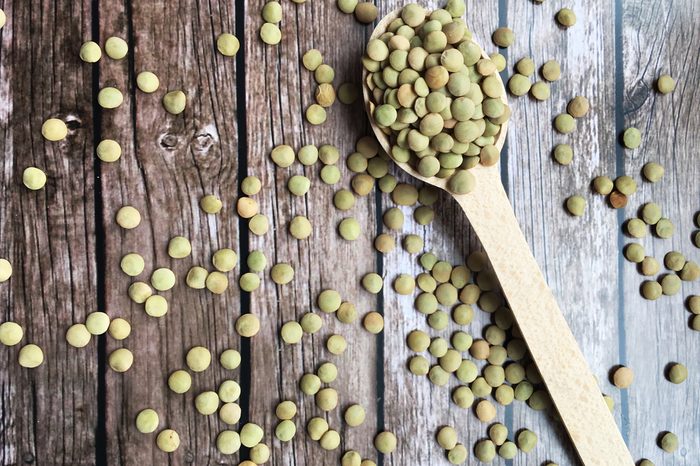
Lentils
While canned beans are great for quickie meals, it’s also helpful to have bags of dried lentils on hand. “Lentils are an inexpensive, high-fibre, and high-protein pantry staple,” says Allison Knott, RDN, a sports dietitian in New York City. “The best part? They’re quick and easy to cook. I recommend cooking a large batch and using some as a meat substitute or in a blended dish with meat—such as in burgers, meatballs, and tacos. The rest can be used to add protein and fibre to salads, or mixed in with grain-based side dishes such as a pilaf.”
Next, learn how to safely shop for groceries during Covid-19.
